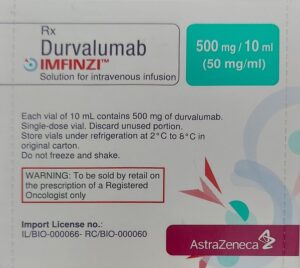Durvalumab Anti-Cancer Injection
Product Description
Durvalumab is a monoclonal antibody that belongs to a class of drugs known as immune checkpoint inhibitors. It is designed to enhance the immune system’s ability to detect and destroy cancer cells. By blocking the programmed death-ligand 1 (PD-L1), Durvalumab prevents cancer cells from evading immune detection, thereby promoting an immune response against tumors. This medication is primarily used in the treatment of various types of cancers, including non-small cell lung cancer (NSCLC) and urothelial carcinoma.
Uses
- Non-Small Cell Lung Cancer (NSCLC): Used for patients with locally advanced or metastatic NSCLC who have not progressed following platinum-based chemotherapy and radiation therapy.
- Urothelial Carcinoma: Indicated for patients with locally advanced or metastatic urothelial carcinoma who have disease progression during or following platinum-containing chemotherapy.
- Other Cancers: Research is ongoing for its efficacy in other malignancies, including head and neck cancers and certain types of breast cancer.
Technical Data
| Parameter | Details |
|---|---|
| Generic Name | Durvalumab |
| Brand Name | Imfinzi |
| Drug Class | Monoclonal Antibody (Immune Checkpoint Inhibitor) |
| Administration Route | Intravenous (IV) injection |
| Dosage Form | Solution for infusion |
| Typical Dosage | 10 mg/kg every 2 weeks |
| Storage Conditions | Store in the refrigerator (2°C to 8°C) |
| Stability | Stable for 24 hours at room temperature after dilution |
| Common Side Effects | Fatigue, cough, nausea, rash, diarrhea |
| Serious Side Effects | Pneumonitis, hepatitis, colitis, endocrinopathies |
| Contraindications | Hypersensitivity to durvalumab or any component of the formulation |
| Pregnancy Category | Category D (Risk to fetus) |
| Approval Status | FDA approved since May 2017 |
Key Points
- Mechanism of Action: Durvalumab works by inhibiting PD-L1, which is often overexpressed in tumors, allowing the immune system to recognize and attack cancer cells.
- Administration: Administered via IV infusion, typically in a clinical setting under the supervision of healthcare professionals.
- Monitoring: Patients receiving Durvalumab should be monitored for immune-related adverse events, which can occur due to heightened immune activity.
Conclusion
Durvalumab represents a significant advancement in cancer immunotherapy, providing a new treatment option for patients with specific types of cancer. Its ability to enhance the immune response against tumors has made it a valuable tool in oncology, with ongoing research aimed at expanding its applications in cancer treatment.

